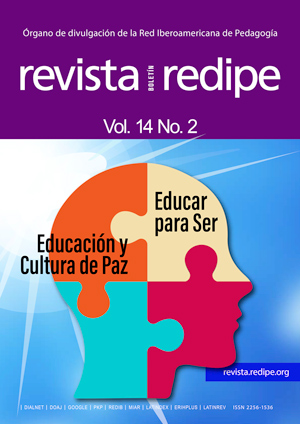The audiovisual language as a didactic device in the collection, analysis and media learning in the representations of the culture of peace of young people from public universities in Bogotá.
Main Article Content
Keywords
Learning, Didactics, Mediation, ICT, Media Environment
Abstract
The path traveled by this academic exercise. has allowed the dialogical encounter between the actors and factors that represent “the senses and meanings of the culture of peace of the young people of the public universities of Bogotá” through the mediation of information and communication technologies in a process of collection, analysis and learning: whose fundamental purpose is the recognition of an identity and a memory by deconstructing, reconstructing and constructing a series of events of several years of pain, displacement and hundreds of deaths: told in narrative texts, pictorial paintings or audiovisual documents by renowned artists and anonymous authors who are part of the armed conflict in Colombia. Today more than ever it is essential to rationalize each of these factes, so that they are internalized in the knowledge of each individual, as a fundamental element of the didactic action with embryonic technological mediation provided with activities and resources, with a pedagogical intention that can lead to a renewal of the formative work, where the protagonist is responsible for his knowledge, do and feel when learning by doing
References
Abric, J. C. (2001). Prácticas sociales y representaciones. México: Ediciones Coyoacán.
Araya Umaña, S. (2002). Las representaciones sociales: ejes teóricos para su discusión.
Alonso, C.M, Gallego, D. J, Honey, P. (1995). Los estilos de aprendizaje. Procedimientos de diagnóstico y Mejora. Bilbao Ediciones Mensajero (6 edición)
Aranda, D.; Creus, A.; Sánchez-Navarro, J. (eds.) (2013). Educación, medios digitales y cultura de la participación. Barcelona: Editorial UOC.
Bonnewitz, P. (2003). La sociología de Pierre Bourdieu. Buenos Aires: Nueva Visión.
Cabero, J. y Barroso, J. (2015). Nuevos retos en tecnología educativa. Madrid: Síntesis
Cabero, J. y García, F. (2016). Realidad aumentada: tecnología para la formación. Madrid: Síntesis.
De la Herrán, A. (2017). ¿Y si nuestra educación estuviese radicalmente equivocada? En A. Medina, A. de la Herrán y M. C. Domínguez (Coords.)., Nuevas perspectivas en la formación de profesores. (pp. 457-517). Madrid: Universidad Nacional de Educación a Distancia.
De la Herrán, A. (2017). ¿Y si nuestra educación estuviese radicalmente equivocada? En A. Medina, A. de la Herrán y M. C. Domínguez (Coords.)., Nuevas perspectivas en la formación de profesores. (pp. 457-517). Madrid: Universidad Nacional de Educación a Distancia.
Fleming, B. (2014, April 1). Adaptive Learning Technology: What it is, Why it matters. Retrieved May 16, 2017, from http://www.eduventures.com/2014/04/ adaptive-learning-technology-mattersP.
Icfes (2018). Guía de interpretación de reporte de resultados del programa académico
Icfes (2018). Reporte de resultados programa académico saber T&T histórico. En línea: http:// www.icfes. gov.co/estudiantes-y-padres/sabertyt-estudiantes/estructura-general-delexamen/ item/1984.
Instituto de Tecnologías Educativas. “Habilidades y competencias del siglo XXI para los aprendices del nuevo milenio en los países de la OCDE”, 2010 Paris.
Johnson, L., Adams Becker, S., Estrada, V., and Freeman, A. (2015). NMC Horizon Report: 2015 Higher Education Edition. Austin, Texas: The New Media Consortium.
Paredes, J., Guitert, M., & Rubia, B. (2015). La innovación y la tecnología educativa como base de la formación inicial del profesorado para la renovación de la enseñanza. RELATEC. Revista latinoamericana de Tecnología Educativa, 14(1).
Rivera, P. Lozano P, Sánchez, J, (2018) Asimilación de competencias en tecnologías digitales en la formación inicial docente. visiones de estudiantes de las universidades catalanas Departament de Didàctica i Organització Educativa, Universitat de Barcelona
saber T&T histórico. En línea: http:// www. icfes.gov.co/estudiantes-y-padres/sabertyt-estudiantes/estructura-general-delexamen/ item/1984.
Torras, E (2018) Fundamentos y práctica del aprendizaje adaptativo. Universidad de Oberta catalunya.



